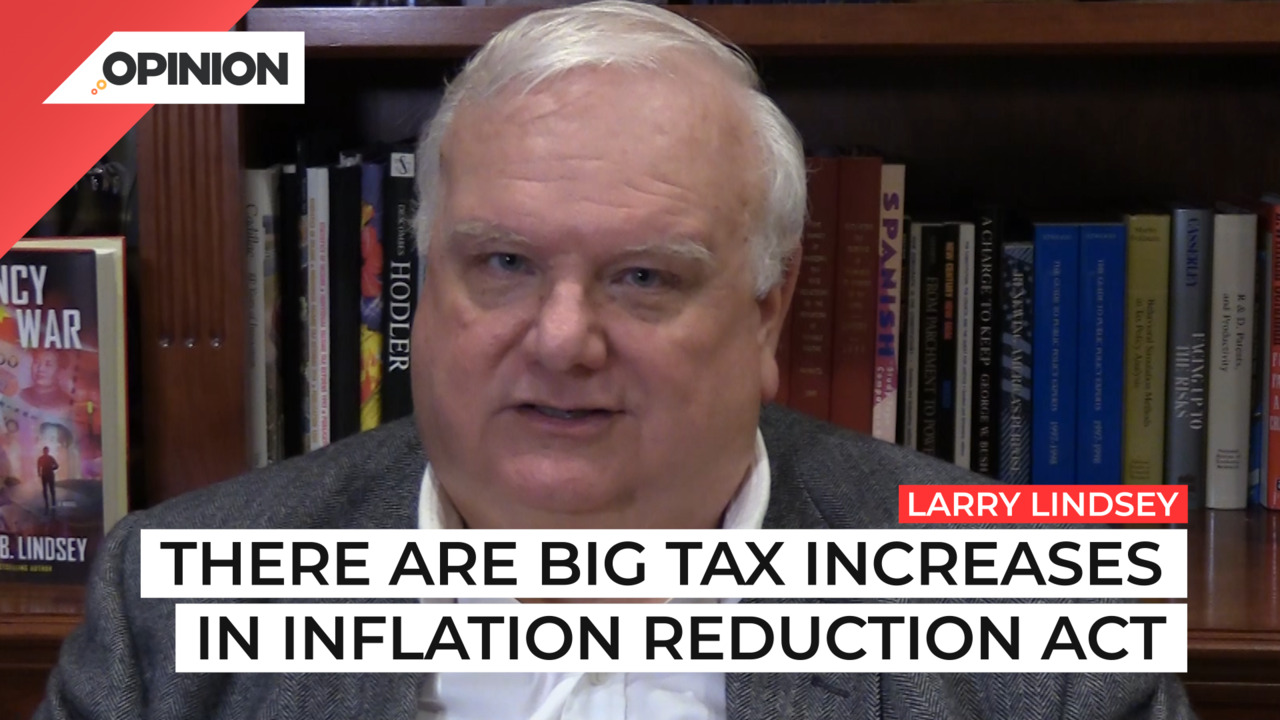
Commentary
-
Our commentary partners will help you reach your own conclusions on complex topics.
It was Shakespeare who coined the phrase, “What is in a name, a rose by any other name would smell as sweet.” Those words were put in Juliet’s mouth to tell Romeo that it didn’t matter that he was from a rival family. Well, it turned out it did matter as we know how it ended.
And so, what is in a name when you’re talking about the Inflation Reduction Act?
Now, the theory is that deficits cause inflation. So what are the actual facts? The Congressional Budget Office, which is the arbiter of such things, says the deficit is going to increase between now and 2026 by $22 billion dollars. Well, that means in the near term, if anything, the bill is inflationary; modestly so.
In fact, the big long-term deficit cuts don’t occur until 2028. Think about that. We’re going to have two midterm elections and two presidential elections by then. So anything could happen. Who knows what the situation is going to be in 2028?
So that’s really not a meaningful deficit reduction. Or over the average amount of the…deficit reduction in the bill, even including those long-term deficits, is just 30 billion per year. The government spends on average, about 4.5 trillion. This is just a tiny fraction of that… less than two tenths of one percent. So to call the deficit reduction meaningful at all, is a bit of a stretch. It is just four one-hundredths of 1% of GDP. It has nothing to do with inflation reduction, no matter how you want to name it.
Also, there are some big tax increases in the bill. Some of them on the energy sector, which are going to make the price of gasoline, a very sensitive inflation topic, go up. There also is going to be a large tax increase on manufacturing corporations. The bill contains something called a “alternative minimum tax” for companies.
Well, the difference between the alternative tax and the regular tax is largely the depreciation of purchases of plants and equipment. Right now, the bill allows you to write them off right away. Whereas the profit base for what the government now wants will not allow you to do that. It’s based on how much the company tells its shareholders that the machinery wore out. That’s likely, according to the National Association of Manufacturer, going to reduce GDP by $68 billion.
Now admittedly, the National Association of Manufacturers is not completely a disinterested observer here. But regardless of the size, this is going to be a negative for GDP. It’s likely to reduce wages by about $17 billion and likely to cost about 220,000 jobs over the long term. This reduces the supply side of the economy. It makes U.S. manufacturers less competitive. If anything that will prove to be inflationary. There are other provisions in the bill that are also going to prove to be inflationary.
The bill increases the number of IRS agents to make the IRS larger in terms of employment than the Pentagon. If anyone’s ever seen the Pentagon, you know that’s a lot of people. Basically tens of millions of Americans will be audited, including large portions of the middle class. Particular targets will be the small business community because IRS agents tend to view that’s where the money is.
That tends to be distracting both for the business and drives up their costs in terms of accounting and lawyers, even if they’re now currently paying their taxes in full…another inflationary aspect of the bill. So from the point of view of deficits reducing inflation, the bill doesn’t do much.
In terms of raising the costs of production for businesses in America, the bill does a lot. Calling it the Inflation Reduction Act really doesn’t make a lot of sense.
-
Election 2024 will boil down to the Great Lakes states
Pollsters and pundits have been engaged in a long debate about how Biden or Trump might win the 2024 election, with much of their focus spent on the “swing state” electoral battlegrounds. While the winners of Alabama or California may be obvious, for instance, who wins Pennsylvania is a more difficult question. Watch the above…
-
Why the Fed should consider Theory of Reflexivity when fixing policy
The Theory of Reflexivity, often used in the context of economics and financial markets, implies that investors don’t base their decisions on reality but on their perceptions of reality. This creates a feedback loop where investors’ perceptions influence economic fundamentals, which in turn alter investor perceptions. Watch the above video as Straight Arrow News contributor…
-
Federal Reserve surpassed its own wildest expectations
On May 14, the U.S. Bureau of Labor Statistics released the most current producer price index (PPI) report, which showed an increase of 0.5% month-over-month in April. After the report’s release, U.S. Federal Reserve chairman Jerome “Jay” Powell said that while he believes the current policy rate is restrictive by many measures, the Fed needs…
-
Polls give slight advantage to Trump in Electoral College
With the U.S. general election only six months away, leading candidates President Joe Biden and former President Donald Trump appear to be engaged in a very close contest. In their 2020 race, the winner of the Electoral College was ultimately determined by a relative handful of voters in just a few swing states, even though…
-
College sports is big money but not everyone benefits
March Madness has wrapped up and Caitlin Clark has emerged as a household name as well as a wealthy student athlete. Earning over $3 million throughout her college career, her success stands in stark contrast to the previous notion that collegiate athletes shouldn’t earn anything beyond their scholarship. Straight Arrow News contributor Larry Lindsey examines…
Latest Opinions
-
 U.S. Department of Defense
U.S. Department of Defense
Congress still trying to figure out how to reduce wasteful military spending
-
 DVIDS
DVIDS
US Navy, Air Force making waves with new weapons at RIMPAC
-
 Getty Images
Getty Images
Israeli PM Netanyahu meets with Trump at Mar-a-Lago
-
 Getty Images
Getty Images
Growing US nuclear power resurgence reaches the nation’s heartland
-
 Getty Images
Getty Images
Beer from the sun, other solar thermal projects get government funding
Popular Opinions
-
In addition to the facts, we believe it’s vital to hear perspectives from all sides of the political spectrum.


